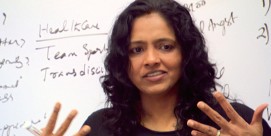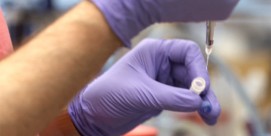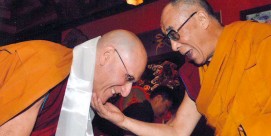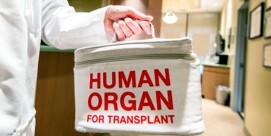In This Episode << SLIDE LEFT TO SEE ADDITIONAL SEGMENTS
Body Donor Memorial Service
PATTI JETTE HANLEY, senior associate producer: Every summer, first-year medical students from throughout Maryland gather with family members of people who donated their bodies to science. It’s a solemn ritual, and it helps to humanize the experience for students who have spent a semester dissecting a cadaver. Around 1,000 people per year donate their bodies for medical research in Maryland.
Religious Leader at the Memorial Service: Gracious and loving God, we gather in this solemn place to remember the lives and mourn the deaths of these that have given so much. Even in death they reached out to those in need of help.
ERIN DEEGAN (University of Maryland Medical Student): We ended up having many discussions while we were going through anatomy lab on moral issues and spiritual issues, and I think it really opens up a forum for a spiritual discussion, because we end up believing different things, but we all appreciate the fact that these bodies are there for our use.
HANLEY: The students come to view the donors’ bodies as teaching tools, with a distinct separation between the physical and the spiritual.

Erin Deegan |
Ms. DEEGAN: Seeing this person there in front of you it’s hard to separate the body from the person, and it takes some time. But I think in the end my faith helped me, because I knew that it was just a body and not a person that I was working on.
HANLEY: Still, when they meet the families they gain a deeper respect for their donors.
Ms. DEEGAN: To be able to see the families and to really feel what they are feeling and to know that these were their relatives and friends and people they really cared for helps me to place it in perspective.
HANLEY: For some of the families, this is the only memorial service their loved ones will have. Donors’ bodies go directly to the state anatomy board after death, and there often is no funeral. Eventually, their ashes are interred near this monument.
LYNN BOOKSTARR (Family Member): I appreciate having this opportunity to honor my parents, both of whom gave their bodies to science, and I also carry a card, and so I will be interred here eventually.
HANLEY: Some family members come to the service every year to remember their relatives and friends. In a few cases, they are inspired to become donors themselves.

Lynn Bookstarr |
Ms. BOOKSTARR: Because I know eventually I will be interred here it gives me a sense not only of the eternal life of those I loved, but also of my — continuing after my death in some way, have my body contribute, and I believe that the soul leaves the body at the time of death and that my soul will be here, as my parents’ souls are here.
Chaplain at the Memorial Service: May their memory inspire us to live justly and kindly. May their souls be at peace, and may they be bound up in the bond of eternal life. And let us say: Amen.







